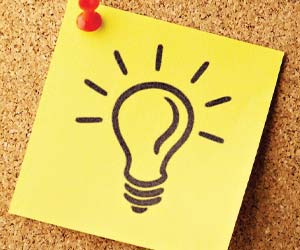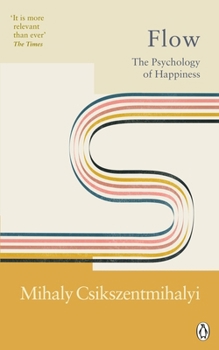Flow: The Psychology of Happiness
Select Format
Select Condition 
Book Overview
"Csikszentmihalyi arrives at an insight that many of us can intuitively grasp, despite our insistent (and culturally supported) denial of this truth. That is, it is not what happens to us that... This description may be from another edition of this product.
Format:Paperback
Language:English
ISBN:1846046955
ISBN13:9781846046957
Release Date:January 2022
Publisher:Rider
Length:384 Pages
Weight:0.84 lbs.
Dimensions:0.8" x 5.3" x 8.5"
Customer Reviews
6 ratings
A Review on Flow
Published by Briana , 2 years ago
Have you ever wondered how some people just seem to have everything under control even under the most difficult situations?
Well this dude has the answers, this concept has been explained in many different ways over the ages trying to achieve happiness, the zone, to become enlightened.
It's what everyone truly seeks. Though their path for it maybe very different.
His method has spoken more to me than any other book on this topic thus far. Approaching it with scientific side relying on data and interviews with people. And if I were to be honest you probably only need to read the first half. Though if your having difficulties grasping a concept I recommend venturing into the second half.
A Cerebral Shock for Understanding Fulfillment
Published by Jay Kay , 2 years ago
Exploring the idea of "Flow States", this book delves into the concepts that make the most fun times in our lives feel like seconds and the worst feel like hours. Supported by experimental data and the scientific process, there are true and defensible psychosomatic results for fulfilling life goals and activities. If you're looking forward to making the most out of life, there are some blueprints that can help you find a path to your joy or vocation in these pages.
Also by the same author is The Evolving Self, which is a great secondary read- albeit more philosophical and waning more broad than Flow does.
A Magnificent Book
Published by Thriftbooks.com User , 15 years ago
Professor Mihaly Csikszentmihalyi, (known as `Mike' and for the record his family name is pronounced "cheek-sent-me-high-ee", His name comes from "Saint Michael from the province of Csik," Csik being originally a Hungarian province) is one of the world's leading researchers on Positive Psychology. The author of numerous books and published papers, Flow is recognized as his most influential book and has had a far reaching impact, selling millions of copies, and used extensively in academia, business, sports, psychology and life coaching. Flow integrates research on consciousness, personal psychology, and spirituality to; "Present general principles along with concrete examples of how some people have used these principles, to transform boring and meaningless lives into ones full of enjoyment." Our Professor describes his work as the effort "to study what makes people truly happy." The emphasis here is on the word "truly"--because to him, happiness is not simply an emotional state. The happiness he points to involves the continual challenge to go beyond oneself as part of something greater than one's own self-interest. Mihaly acknowledges throughout that Flow research is deep rooted in Ancient Wisdom starting with Aristotle's the good life. Aristotle's model of the good life is `Eudaimonia', "the state of being well and doing well," often translated as meaning `happiness'. The Taoist philosophy of `doing without doing', Yogi traditions, Jesuit teachings, heavy reliance on Stoic and more recent philosophy and his own extensive scientific research of which he documents many examples, including in the notes section reference to a `pot pourri' of high achievers. We are introduced to how the principles of Flow can help us overcome external influences by so doing this also positively impacts, first of all ourselves, and then our experiences with close "Full" interpersonal relationships, good health, wisdom, awe, maturity, charity, moral development, self-control, purposeful striving, creativity, and professional accomplishments. Mihaly indicates; "The reality is that the quality of life does not depend directly on what others think of us or on what we own. The bottom line is, rather, how we feel about ourselves and about what happens to us. To improve life one must improve the quality of experience." "To gain personal control over the quality of experience, however, one needs to learn how to build enjoyment into what happens, day in, day out." So just like Krishnamurti tells us, "We must open the door ourselves" Mihaly reminds us that the impediments to Flow are located within the individual or "the roots of discontent are internal" and each individual "must untangle them personally, with his or her own power." to our Professor teach us how "whenever the goal is improve the quality of life, the flow theory can point the way" and like some people, we can also have a "good time standing at a bus stop" or "waiting in a dentist's office" and live a
Finding Flow
Published by Thriftbooks.com User , 15 years ago
Besides having more vowels in his name than any other researcher in the field of positive psychology, Mihály Csíkszentmihályi is probably best known for his book "Flow". So what exactly is flow? Well, there are short and long ways to define the concept of flow. The short way is to tell you that flow is roughly the equivalent to what most people refer to as being "in the zone" or "in the groove". More elaborate definitions might be that it is "the state in which people are so involved in an activity that nothing else seems to matter; the experience itself is so enjoyable that people do it even at great cost, for the sheer state of doing it." Being such a desirable state, flow is naturally linked to happiness. The book feels that the path to happiness is a circuitous one that begins with one achieving control over the "contents of our consciousness". I'm taking that to mean that if I learn to find flow experiences, it will lead to greater happiness. Know from the get-go that "Flow" is NOT a step-by-step book that gives you tips on how to be happy. Instead, the book summarizes years of research, so what you get when all is said and done, are general principles along with examples of how people have used them to transform their lives. The hope, then, is that you will have enough information in the book to make the transition from principles and theory, to actual practice. In a nutshell, "Flow" is a unique and interesting book that examines the process of achieving happiness through the control of one's inner life and is a classic in it's field. Other positive psychology books I liked include "Finding Happiness in a Frustrating World".
Flow Is Fun!
Published by Thriftbooks.com User , 22 years ago
If you are in any competitive sports, read this book. If you play golf, tennis, or any other such sport as a hobby and you want to do better, read this book. Flow refers to a state where you are totally absorbed in what you are doing. You lose self-consciousness. The one sure way to fail at a competitve endeavor is to be concerned with how you appear to others or how you are being evaluated. Your mental energy is drawn away from the competitive endeavor and what you need to be focused upon. You want to be in the flow. Not worried about your ego. (all competitor mind games essentially try to throw you out of a flow experience)As Csikszentmihalyi says if you are playing a game of tennis and suddenly you start thinking about how you are doing overall, your concentration is broken. It will become really hard to win. You want to only focus upon each serve or return shot as you are making it. Not the one before or the next one. Not how great or how poorly you are doing. You want this to happen naturally. You don't want to be saying to yourself, "I want to concentrate on each shot. I want to concentrate on each shot." You just want it to happen. The experience becomes, as Csikszentmihalyi calls it, an autotelic experience. What you are doing becomes an end in itself. And the best part of being in flow is that when you are in it, you will be enjoying yourself. "Flow: The Psychology of Optimal Experience" is one of the best books ever if you want to understand human performance and what separates those who win from those who lose...
Stephen Covey, Anthony Robbins, step aside!
Published by Thriftbooks.com User , 24 years ago
The publications and blather out there are endless! The 7 Habits of Highly Effective People, Personal Power, First Things First (duh!) are great feel good books, but what does one really get out of them? Well, after reading them, one supposedly knows what successful people do, what to do first, or maybe have an increased sense of personal power. Somehow, I don't think so.Enter Mihaly Csikszentmihalyi and the idea of Flow. Flow is about finding meaning in a particular activity, profession or if one is really fortunate in life. The bottom line is that to achieve maximum happiness, enjoyment, or even "success" a person will often have "flow" experiences. It's when worries slip away, when a person or a team is engaged in an activity, and is so focused that it seems effortless. Covey, Robbins, and the rest of em', will present you with a square peg which you may be able to smash into a round hole if you keep hitting it hard enough. Understanding, yourself and what brings you satisfaction in life must come before following any prescribed method for improvement or success. If you love what you do, and do what you love, you don't need some guru to give you the steps to success.Flow can help you find and understand that. You've got to start with the basics, and this book can provide insight on what flow is, what conditions facilitate it, how to achieve it, and where to start. Highly recommended!
Flow: The Psychology of Optimal Experience Mentions in Our Blog

Second Semester Reset for Students
Published by Ashly Moore Sheldon • January 12, 2023
High school and college students may be feeling weary as they head back into classes during these winter months. Here are some books and guides to help them get organized, focused, and energized.






